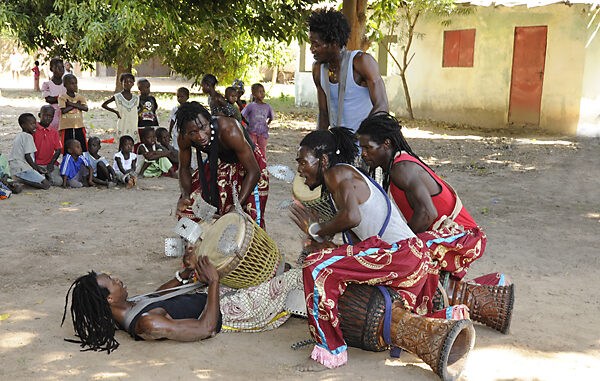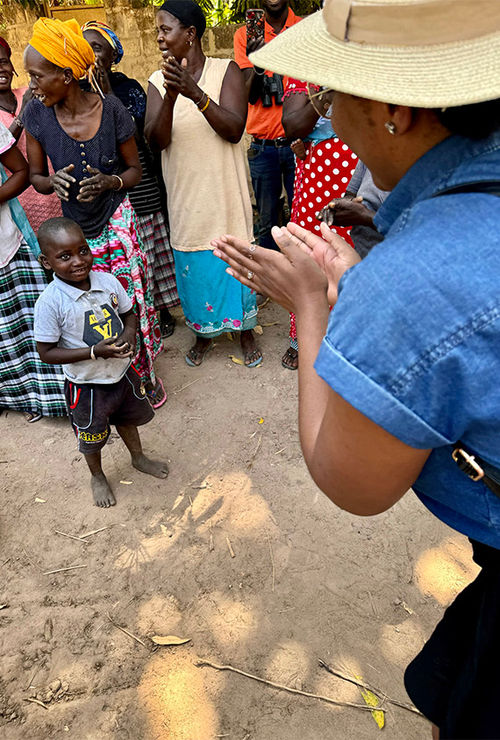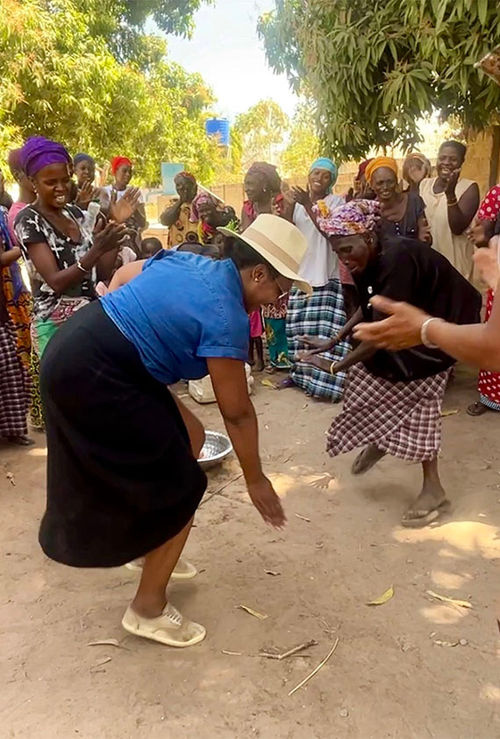
My father is Nigerian, from the village of Uduere in the town of Ughelli. When I was young and growing up in Los Angeles, he would take me to his “meetings” every third Saturday of the month, which were like town council meetings made up of other Nigerian communities that were spread across Southern California.

Nicole Edenedo encourages a boy to dance. Source: Nicole Edenedo
It was a way for Nigerians living in Southern California to organize and build community while passing on traditions and giving their children a chance to socialize with other kids from similar cultural backgrounds.
During the meetings, the men would do business. The women would cook. And the kids would play. At the end of the year, there was a big banquet with lots of Nigerian food, live music and usually a dance performance by the children.
One year, I performed in one of those banquet dances. The memory of the actual performance escapes me but I remember the rehearsals; learning how to move, two steps on each count, heaving my chest in and out as I bent over and snapped back up, sandwiched between other girls as we all moved in a circle.
Most of all, I remember the napkin. It was the cherry on top of the dance routine that the women were teaching us girls, in my mind at least. As we moved in the circle doing the routine, we were to take the napkin, sweep it up into the air as if brushing the sky, and swoop it down to the ground as if sweeping the floor or dusting off your shoes.
I didn’t understand any of it — the dance routine, how I got roped into this or when it would all be over. I was 6 or 7 years old and had better things to do, like keeping an eye on the main entrance to the banquet hall so I could look out for Andy, the first boy I ever loved, who only came to important events in this group because his family lived so far away, all the way in San Diego.
But I understood the napkin and its sole purpose as the prop that would make this dance routine complete. So I leaned into my calling during those rehearsals and later, the banquet performance, and swept, swept, swept.
Little did I know that a couple of decades later, I would find use for my napkin-sweeping dance skills during a drum and dance circle in the village of Dumbutu, part of the district of Kiang West along the Gambia River, where I sailed on a seven-night river cruise with Variety Cruises. The village is right next door to Kiang West National Park, an important wildlife reserve that’s home to multiple species of birds, baboons and wild hogs.
Dumbutu is also about a 20-minute drive from Tendaba Camp, a safari-style tourist camp and cultural center that offers guided bush trips, birdwatching excursions and village tours.

Nicole Edenedo motions her hand to sweep her feet during a welcome drum and dance circle. Source: Nicole Edenedo
I’m told that the village doesn’t see a ton of tourist groups outside of Variety Cruises guests, so as a way to thank us for passing through, the women from the community come out, sometimes before cooking lunch for their families, to greet us with a drum and dance circle.
The energy was like any other folk dance gathering. There was a woman banging on a plastic jug with two wooden sticks while a baby wrapped up in cloth clung to her back; there was rhythmic clapping and stamping of feet; bodies twirling and hands pumping into the air; toddlers catching the spirit and doing their best to mimic the moves of everyone else before realizing they’ve taken a step too far away from mama, quickly running back to her.
I moved as the women did. Clap. Clap. Clap. Stomp. Clap. Stomp. Stomp. Clap.
All the while, I knew I had more in me. Was Gambia ready for this Nigerian? Ancestors, is that you I hear calling? Oh, if Andy could see me now. I went for it.
Clap. Stomp. Stomp. Clap. Clap. Stomp. Sweep. Sweep. Sweep. Sweep.
